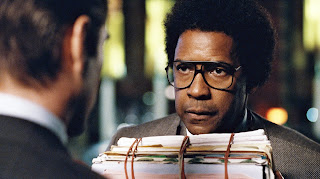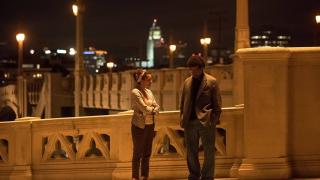SPOILER ALERT! The plot will be discussed.
Roman J. Israel, Esq. (2017) is not just about a stereotypical crusading attorney trying to do good, although his name suggests the establishment of laws in ancient Rome, and the struggle for freedom by the Jews in their own country. He always stresses, the “Esquire” because, as he says latter, it’s a title of dignity, “slightly above ‘gentleman’ and below ‘knight,’” probably a designation he would like his profession to be worthy of. The main character does want to accomplish judicial reform, but he is a conflicted man who is capable of succumbing to the pessimism of fighting a broken legal system and willing to give into his selfish needs. The film examines the internal conflict between the angels and demons inside a person, and the hope for redemption.We know right from the beginning that Roman (Denzel
Washington) is a flawed person because he is writing up a legal brief suing
himself, stating he should be disbarred for being a hypocrite and betraying
everything he stood for. But, the fact that he is indicting himself shows that
he is aware of his violations. IMDb notes that the letters are in all caps
except the word “he,” implying that Roman is a servant of something greater
than himself, possibly the righteous intention of the law. The typing with Roman’s
voice-over allows for backstory to be introduced. Roman worked in a two-partner
law firm in Los Angeles, and his job was “drafting briefs, motions, and
pleadings.” But his partner took care of the courtroom activities.
Roman is behind the times with what is happening in
the present, as he doesn’t even know that another attorney retired a few years
ago. He is afraid to go through security, saying the detection equipment will
wipe out the songs on his early generation iPod. He carries a flip phone. The
prosecutor in the first case doesn’t even know that Roman was the partner.
Roman tells her that he doesn’t have the temperament for what happens in a
courtroom. He shortly shows why since he is sarcastic about what he considers
is the severity of the charges against a seventeen-year-old for breaking and
entering. She says the defendant was caught wearing a gang member’s insignia.
Roman’s sharp response is that’s like wearing “a flag pin in a lapel.” He is
saying the display of an affiliation does not mean it should finalize a
judgment of someone. He is confrontational, accusing her of just trying to
advance her career. She says her conviction rate is “one hundred per cent,”
which is a warning, but also sounds like a boast, which justifies Roman’s view
of her. He argues that the youth has one minor prior offense, his dad is in
jail and his mother is a drug addict. He joined a gang for protection given
circumstances beyond his control. Roman says, “Each of us is better than the
worst thing we ever did.” His remark indicates that Roman sees a person as a complex
creature and should not be judged in his or her entirety by one action. (Washington
said that he saw Roman as being on the spectrum, which would account for his
lack of social skills).
George assigns similar cases that will pay little to
Roman. George gives these clients the same canned reassurances about getting
the best defense possible as he attempts to appear as if the firm is handling
cases for people on the economic fringe. However, he does not utilize full
resources on these cases. Roman hears a Latino lawyer, Salinas (Tony Plana),
telling an unfeeling joke about a domestically abused woman, and then states an
ethnic slur which offends Salinas. The attorney doesn’t like it when he is on
the receiving line of nasty comment. Roman then says that lawyers like Salinas are
“tourists,” as if to say they are just visiting the lives of the clients, but
not emotionally committed to the defendants’ plights.
George later chastises Roman for insulting the number two man in the firm, Salinas. Roman’s reluctance to embrace modern times is again shown when he says he didn’t respond to George’s email by saying, “I’m sorry, when people send an email, they seem to think it goes straight to your brain.” Roman says George brought him onboard, “to put your feet to the fire ‘cause you’re tired of treating low-income clients like dollar signs, and maybe because you remember what it was like to actually care.” Roman is giving George credit, which George doesn’t want to accept, probably because he knows the prime function of most law firms is to “make a buck.” Roman then reveals what that huge collection of paper documents he carries consists of. He has 3,500 names for a class-action suit to reform the plea-bargaining system, where, he says, “guilt or innocence is being completely replaced by fear of having your day in court where people are being forced … to plead guilty under the threat of overly harsh, coercive sentences.” He adds that reforming the system is a job for a “legend,” which may be an attempt to persuade George to take up this fight. Or, Roman may also be showing his ego as the squire who wants to be a knight in shining armor. In any case, he urges George to use his resources to reform the legal system. Despite the impassioned speech, George just wants Roman to handle the cases assigned to him.Roman sees Derrell Ellerbee, Felicity’s brother, and tells the inmate that he can be charged with second-degree murder for aiding and abetting since he knew the accomplice carried a gun to the robbery that resulted in the death of the victim. Derrell wants to make a deal, saying he will testify against his partner, Carter Johnson (Amari Cheaton), and will divulge where he is hiding. Faced with no hope of acquiring help to fight the rigged system, Roman first tries to reduce the charge against his client. But the persecutor will not go below a ten-year sentence and refuses to hear any more debate from Roman. Her response pushes Roman’s anti-establishment button as he condemns her by saying, “I’m sorry for taking a nanosecond off of your assembly line rubber-stamp existence.”
Roman, who doesn’t even have a car in the automobile-dependent city of Los Angeles, which also points to his outsider existence, still attends the meeting that Maya invited him to. He is there to speak about the rights of those arrested for civil disobedience. Roman starts out with an urgency for protesting the wrongs of society, and the cost for opposing the powers in command. But, his old-fashioned ways get him into trouble with a couple of young women in the group who consider what he calls “chivalry” to be sexist when he says that men should let the two females sit down. (We again get a reference to the way Roman sees himself as a knight, like Don Quixote, fighting against a corrupt world). The women are belligerent and Roman argumentative, and he walks out. Maya follows him, and he admits to saying the wrong things. He admits to his outsider way of being, saying he was not meant for this world, being a forceps-delivered baby. As the two talk, Maya notices a homeless man sprawled out on the sidewalk. Roman thinks the man is dead as a police car stops close by. Roman puts his card in the man’s pocket, but the cops tell him not to put anything on the body. The man comes to, and stumbles away. Roman wanted to be contacted by the coroner so he could pay for the funeral. He tells the cops he gave his information so the man “doesn’t end up as just some body. He’s a person.” The scene shows how Roman’s desire to treat even the dead with decency contrasts with the resistance of the law enforcement system.
Roman’s holier-than-thou attitude backfires on him
since his attempting to bargain for his client and then rejecting the
prosecution’s offer without informing his client allows for an attack on
Derrell Ellerbee to take place. The youth is killed before being put into
protective custody. George is furious with Roman, saying it opens them up to a
lawsuit. He says he will retain Roman until his work is done and then will fire
him. If Roman doesn’t go along with the plan George will have him disbarred.
Roman is mugged on the way home at night and he fights
the man off saying, “You’ve got the wrong guy.” His statement refers to the
fact that he has no money, but more than that, ironically, it means he is being
attacked by the kind of social outcast he has been trying to help. He then
visits his comatose partner. He shares his disillusionment with Jackson’s wife.
He tells her that there are places where people sit on beaches and enjoy life,
and he now implies that he is going to drop out of an irretrievably broken
system and take care of his own needs.
His new stance of thinking about his own needs seems
to be paying off. George starts up a new pro bono program that Roman will head.
This proposal seems ideal since Roman will be helping poor people but through a
rich law firm that can pay him a good salary. Also, Maya calls to ask him out
to dinner. He takes her to a fancy restaurant whose expensive menus contrasts
with Maya’s talking about how Roman’s progressive activism on behalf of others was
a real inspiration to her just as she was having doubts about achieving justice
for the disadvantaged. He seems to justify her skepticism and his own by saying
that “purity can’t survive in this world.” He says something that is illegal,
like stealing a car, can be a tool for escape. He is justifying doing something
unlawful, like taking the reward money based on his client’s information, which
allowed him to get away from his failing attempt to right the wrongs of the
justice system. Maya is acting as his conscience, reminding how “blessed” it is
to believe in a cause.
George confesses to Roman that he was not going to be
a lawyer until he had a class with Jackson who showed the possibilities of
making positive changes for the good in the legal system. George then committed
to the law, but he says that one has to make a living and now owns several
offices. Jackson saw his mercenary ways as “drowning in the shallow end” of a
pool, a nice metaphor to point to the lack of meaningful depth in George’s
work. George is even ready to help Roman with his long struggle to attack the plea-bargaining
problem that denies the opportunity for trials. Now that Roman is there,
George’s desire to connect with the disadvantaged community is renewed, and it
is ironic that George’s capitalistic ways have had the opposite effect on
Roman.
He receives a call from Maya who is sad because a
volunteer quit saying that he was just there to improve his resume. Roman’s
comment is, “The ability to have conflicting ideas in one’s head takes effort.”
He may be talking about the worker, but he could be referring to himself, torn
between his idealism and skeptical selfishness. He says he is in a desert, and
she thinks he means the barrenness that can exist in one’s mind. Of course, she
is also correct. Her advice is to move oneself out of that lonely place, and
that is what Roman literally and figuratively does.
Roman goes back to the firm and uses its legal
resources to continue his epic plea-bargaining suit. We now return to the
beginning of the film as we see him preparing the petition against himself. As
he is typing, a worker says he heard that Roman accepted the reward money for
the case he was working on and asks if the rumor is true. Obviously, Carter has
publicized Roman’s crime. He tells his assistant he is leaving and that the man
can handle the workload. He meets Maya at a bar and gives her the bulldog, as
if passing to her the torch of what’s “vital” in the practicing of the law.
George saw Roman on the street and followed him to the
bar. George heard of the accusation about the reward. Roman says he doesn’t
care about the money, and he is heading to the police station to turn himself
in. He says he had an epiphany that he is, “the defendant and the plaintiff
simultaneously.” He goes on to say that he convicts himself, and “the only
thing left is forgiveness, and I grant that to myself. An act doesn’t make the
person guilty unless the mind is guilty as well.” It is a controversial
statement, since although true forgiveness must eventually come from within,
one can be objectively guilty while believing what one has done is a righteous
act.
Roman tells George that the young lawyer can have a
“shining” future, which may again hint at the “knight in shining armor” he
envisions a great lawyer can be. As he walks off a car stops and a man with a
gun gets out. Roman receives a call and says he remembers who the caller is,
since he gave him his business card. He is in the act of serving someone again
when George hears a shot. We do not see Roman, but George approaches and finds
Roman’s thick briefcase on the ground, and we know that Roman is dead, as he
has paid the price for his loss of faith in his quest.
The next scene shows George opening Roman’s briefcase
and reviewing the documents. Maya instructs followers concerning legal protests
as Jackson’s bulldog sits above her meeting, watching over her. After having
the law firm prepare the argument, George submits the documents in Federal
Court. He is honoring Roman’s legacy, as is Maya. Roman mailed back the reward money,
minus five thousand dollars, which he had hoped to repay. He says in his letter,
“We are formed of frailty and error. Let us pardon, reciprocally, each other’s
follies. That is the first law of nature.” His last words transcend written
statutes and suggest practicing compassion is what would prevent human transgression.
The next film is Black-k-Klansman.

















No comments:
Post a Comment
Please share your thoughts about the movies discussed here.